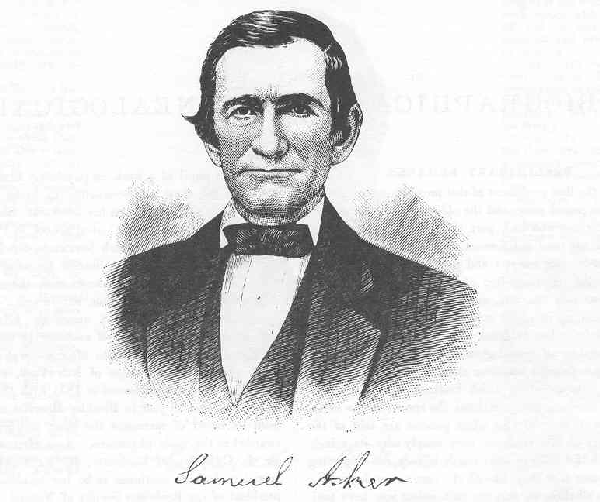

ALFRED, THOMAS J., son of William and Catherine, was born October 3, 1803, in Brandywine Hundred, DE, the youngest of nine children. He was married by Rev. Henry Boehm, February 23, 1826, to Hannah Bonsall Fisher, born near Mortonville, Chester County, February 14, 1801. They were prominent members of the Grove Methodist Episcopal Church, and were the parents of eleven children, of whom nine lived to maturity. William R., one of the sons, a graduate of Dickinson College, died in the army, August 8, 1865. A daughter became the wife of Rev. George W. Lybrand, now of Minersville, PA. The father died December 11, 1880.
ALISON, D.D., FRANCIS, was born in the county of
Donegal, Ireland, in the year 1705, and completed his studies at the
University of Glasgow. He came to America in 1735, and was for a while
engaged as tutor in the family of the father of John Dickinson, of
Delaware. He was licensed as a Presbyterian minister in 1736 or 1737, and
on May 25th of the latter year was installed pastor of the New London
Presbyterian congregation, in Chester County, Pa., where he continued fifteen
years.
In 1743 he opened an academy in New London, which became a justly celebrated institution, and served to aid in furnishing the Presbyterian Church with well-qualified ministers and the State with able citizens.
In 1752 he removed to Philadelphia, and took charge of the Philadelphia Academy. In 1755, upon the establishment of the University of Pennsylvania, he was appointed vice-provost and professor of moral philosophy. He was also assistant minister of the First Presbyterian Church.
The degree of Master of Arts was conferred upon him by Yale College in 1755, and by the College of New Jersey in 1756; and the honorary degree of Doctor of Divinity by the University of Glasgow, in Scotland, in 1758. This last distinction, now so common, was then rare, and was only conferred upon men of the most distinguished abilities and learning.
Dr. Alison was a man of high character as a Christian, a scholar, and a preacher. He had an unusually accurate and prfound acquaintance with the Greek and Latin classics, and was well informed in philosophy, history, and general literature. To his zeal for the diffusion of knowledge Pennsylvania owes much of that taste for solid learning and Classical literature for which many of her principal characters have been distinguished.
He opposed the throwing off of the proprietary government, and as a reward for his services Richard Penn, is is said, gave him a fine tract of land at the confluence of the Bald Eagle with the west branch of the Susquehanna.
He was the founder of the "Presbyterian Society for the Relief of Ministers and their Widows" and the first named of its trustees. Although he family could ill afford it, he made provision in his will for giving his slaves their liberty.
He had considerable influence in the ecclesiastical judicatories, and in the controversy which agitated the Presbyterian Church in his day he adhered to what was termed the "Old Side".
He died November 29, 1779, in the seventy-fourth year of his
age. The maiden name of his wife was Armitage. Among other children, he
left a son, Dr. Francis Alison, who became a physician of eminence, and
who was the father of the late Dr. Robert Alison of Jennerville, and of
Oliver Alison, at one time sheriff of Chester County.